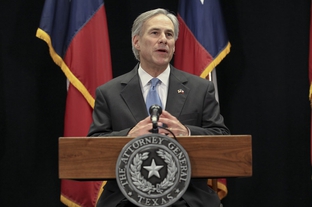Vindicated, More or Less

A fair number of Republicans spent the last two months, or three, griping about the state's top lawyer, as delays and legal complications piled up in the fight over redistricting maps.
They were frustrated. Some blamed the courts. Some blamed Democrats, half-heartedly, for fighting back in the same way the Republicans fought back when the Democrats were in control of the crayons. But many of them from both the government and the party, were blaming the attorney general.
Greg Abbott's decision to go to the U.S. Supreme Court provided fuel for his supporters and his critics. The Texas federal judges drew their first interim maps in plenty of time to hold primaries on March 6 — in fact, that's why they drew them when they did — and it was the appeal to the Supreme Court and that court's decision to take the case that delayed the primaries.
Without those delays, the state would have a key role, voting next week in an undecided Republican primary that might well be over by the time we finally have an election on May 29.
Some blame Abbott and his legal team for that and other strategies (like going to the courts in Washington for preclearance instead of taking the more common administrative path through the Department of Justice) that took Texas out of play in the presidential race. His friendlies can argue that the Texas judges should've done in November what they finally did this week, saving all the trouble.
And his supporters do step in here, arguing that his decision to go to the Supremes set up a couple of important things. One, it got the courts to say legislative plans — even those that don't have the required Section 5 seal of approval — have to be used by courts as the starting points for interim maps. Their second point is that the maps unveiled by the judges this week are much closer to those originally issued by lawmakers, and thus closer to what the GOP wanted than the maps the court offered last year.
Call it half-vindicated. The delay in the primaries, however the blame is located, could hurt turnout in addition to frustrating Republican voters who wanted a meaningful vote in the top race. If the turnout produces a funny bounce in the May primary or the July runoffs, Abbott could be on the hook again.

